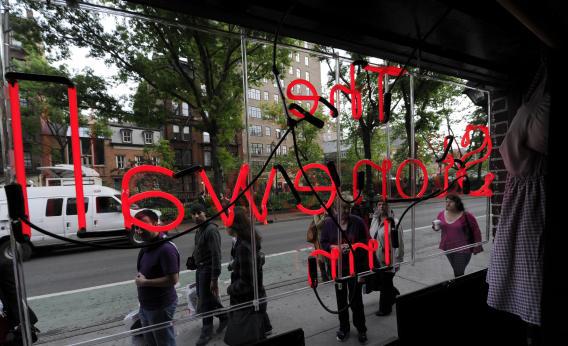Adam Davidson profiles the small business owners of the Greenwich Village neighborhood where we both grew up, and finds that many of them are still plugging away even though it would have been more profitable to sell their leases to big national chains that can better take advantage of the currently upscale state of the neighborhood.
It’s a good piece, but I did want to clarify something. The conceit seems to be that it’s somehow surprising or shocking that a business owner would be “disavowing economic theory and not trying to maximize her profits.”
The thing is to the best of my knowledge there is no economic theory that says small business owners maximize profits. Think about it from a workers’ perspective. People who work on commercial fishing operations earn a lot more money than most people with comparable levels of education. But nobody thinks it defies economic theory that America’s retail clerks don’t quit their jobs en masse to go fishing. Commercial fishing is dangerous and you have to live on a boat. All else being equal, people prefer to earn more money but they also prefer to do safe work and have the opportunity to socialize. What economic theory says is that workers maximize utility and therefore employers who want to get workers to do something that’s unusually dangerous or unusually unpleasant will have to pay a premium. A small business operator is in the same situation. She’s balancing income against other lifestyle factors, including the hours put in on the job, the pleasantness of the work, the sense of self-esteem that comes from having something to do, possibly a sentimental attachment to a particular location or certain employees. What economic theory says is that a profit maximizing small business person has to be someone with a very unusual utility function.
Where profit maximization enters into the picture is precisely with the widely held large business. The idea is that owning a small equity stake in a big company is not a pleasurable experience, it’s just something people do for money. Consequently, the widely held firm is owned by a bunch of people who want the firm to maximize the value of their shares. Therefore the managers of the firm are supposed to have an obligation to maximize shareholder value, which perhaps can be achieved by maximizing profits. More to the point, if a firm isn’t being run in a way calculated to maximize shareholder value the firm is vulnerable to being bought by someone else who’ll shake things up so as to maximize value.
It’s interesting to inquire into the extent that that actually happens. In practice, even the dread leveraged buyout firms have a limited ability to take companies over. Nobody’s going to lend Mitt Romney $1 trillion to buy Apple, lever the company up, and start paying out huge dividends even though on paper it seems like you might be able to make money that way. But it’s at least true that economic theory in some sense predicts that big public firms will operate like that. Normal people, however, are predicted to be making tradeoffs and that’s exactly what we do.
